Positive Leadership Theory: Skill Development for Workplace Success
VerifiedAdded on 2023/06/07
|13
|783
|204
Presentation
AI Summary
This presentation focuses on positive leadership and its impact on employee behavior and organizational performance. It explores how positive leaders influence employees, improve performance, and reduce stress and turnover through psychological capital (PsyCap). The presentation covers key aspects such as overcoming work harassment, the additive value of positive PsyCap, the impact of supportive work practices, and the contagion effect of global leaders' positive PsyCap. It emphasizes the importance of managing psychological resources, fostering positive emotions, and creating a supportive work environment to enhance employee engagement and overall organizational success. The presentation references several studies highlighting the practical strategies for leveraging and developing employees' psychological capital to help them better cope with workplace stress. Desklib provides solved assignments for students.

The positive leader
Paraphrase This Document
Need a fresh take? Get an instant paraphrase of this document with our AI Paraphraser
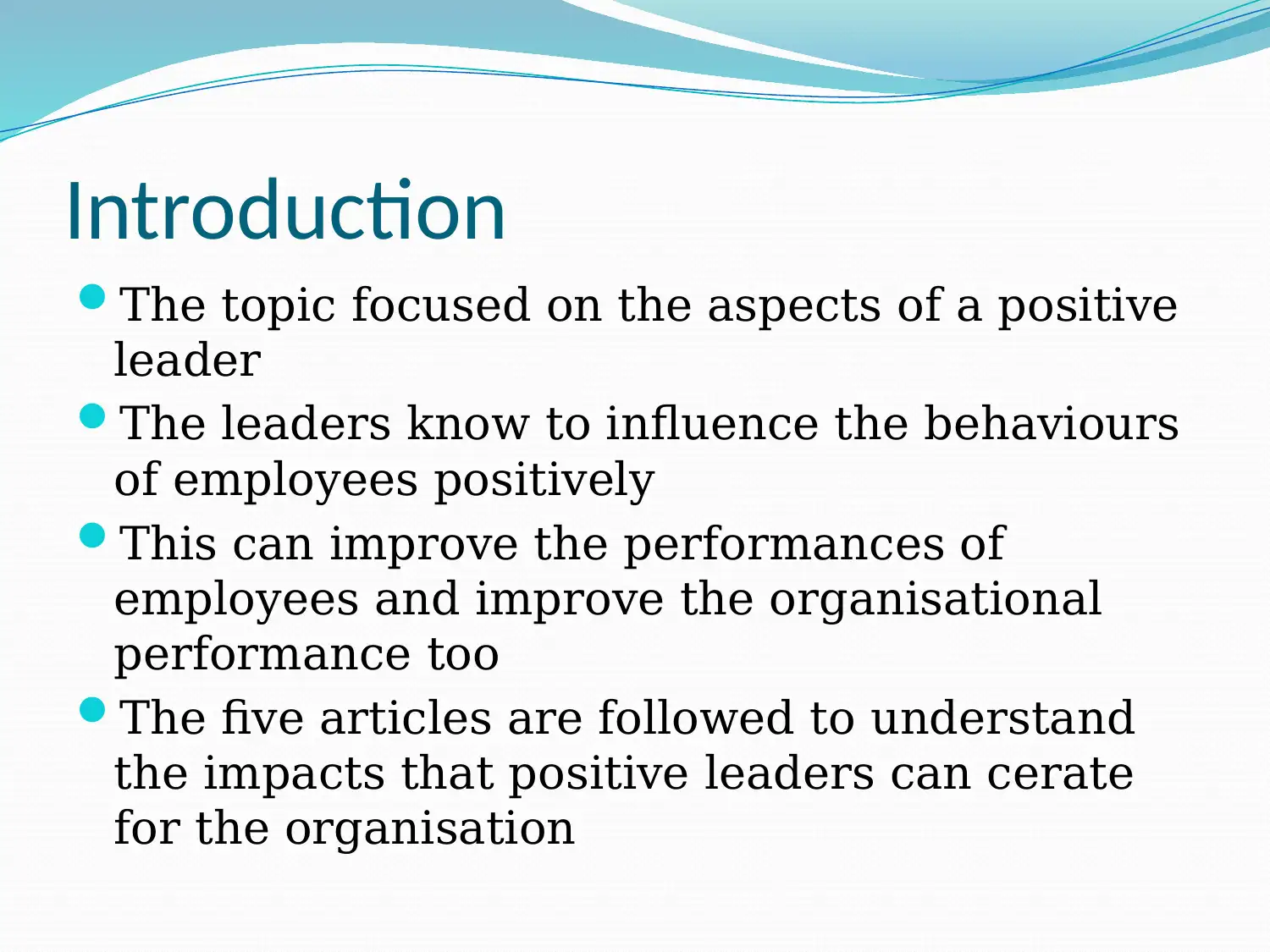
Introduction
The topic focused on the aspects of a positive
leader
The leaders know to influence the behaviours
of employees positively
This can improve the performances of
employees and improve the organisational
performance too
The five articles are followed to understand
the impacts that positive leaders can cerate
for the organisation
The topic focused on the aspects of a positive
leader
The leaders know to influence the behaviours
of employees positively
This can improve the performances of
employees and improve the organisational
performance too
The five articles are followed to understand
the impacts that positive leaders can cerate
for the organisation
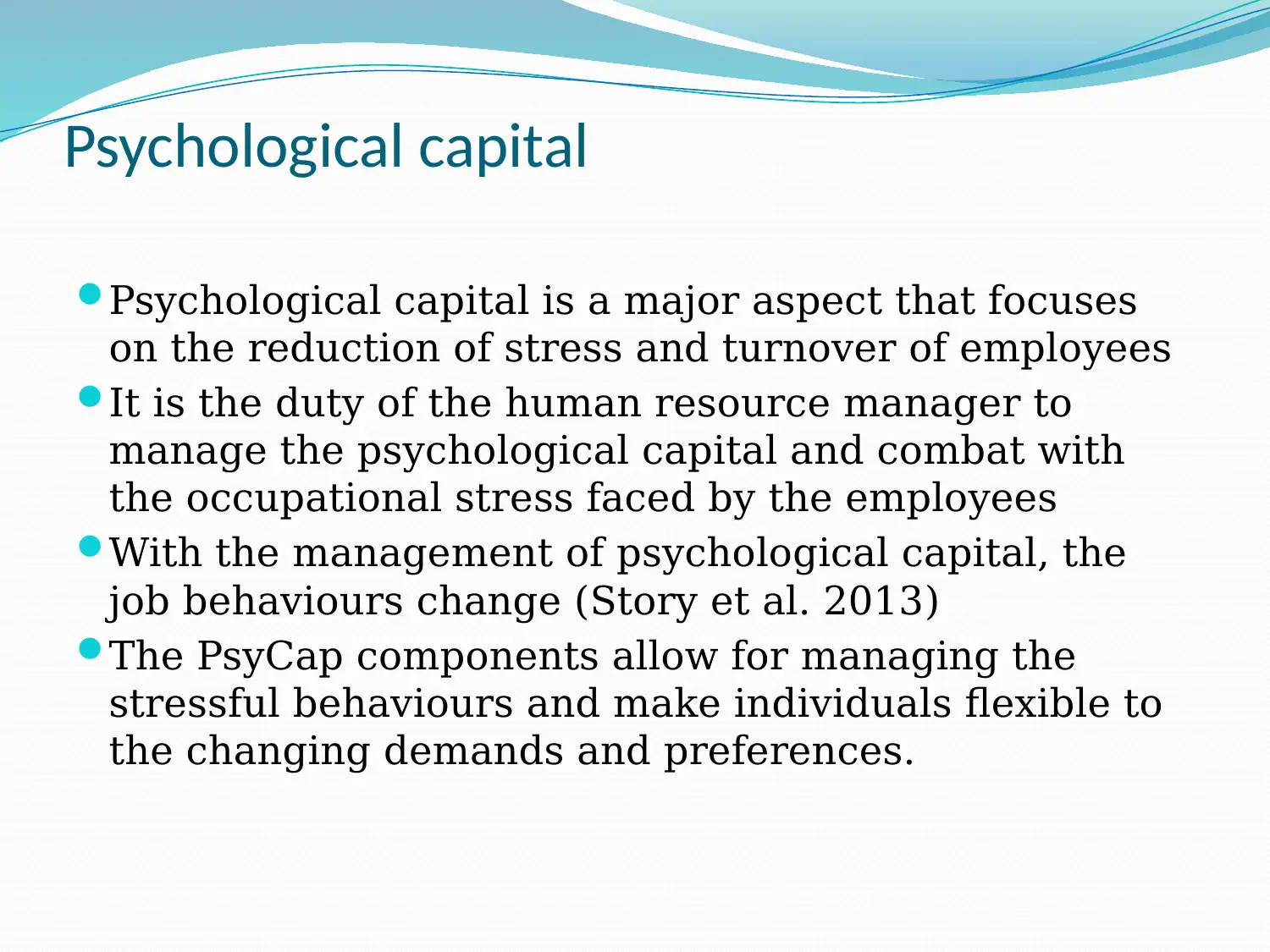
Psychological capital
Psychological capital is a major aspect that focuses
on the reduction of stress and turnover of employees
It is the duty of the human resource manager to
manage the psychological capital and combat with
the occupational stress faced by the employees
With the management of psychological capital, the
job behaviours change (Story et al. 2013)
The PsyCap components allow for managing the
stressful behaviours and make individuals flexible to
the changing demands and preferences.
Psychological capital is a major aspect that focuses
on the reduction of stress and turnover of employees
It is the duty of the human resource manager to
manage the psychological capital and combat with
the occupational stress faced by the employees
With the management of psychological capital, the
job behaviours change (Story et al. 2013)
The PsyCap components allow for managing the
stressful behaviours and make individuals flexible to
the changing demands and preferences.
⊘ This is a preview!⊘
Do you want full access?
Subscribe today to unlock all pages.

Trusted by 1+ million students worldwide
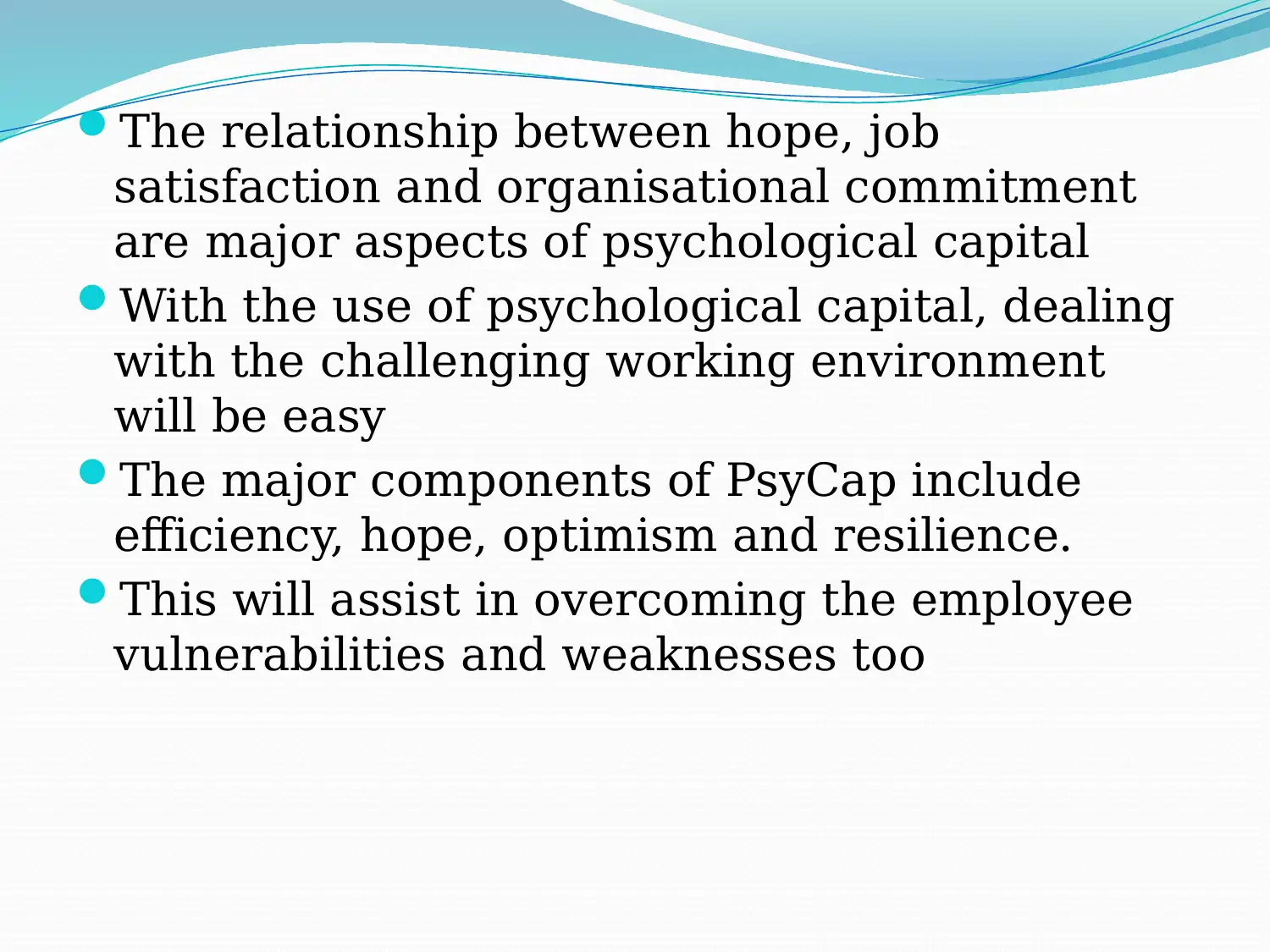
The relationship between hope, job
satisfaction and organisational commitment
are major aspects of psychological capital
With the use of psychological capital, dealing
with the challenging working environment
will be easy
The major components of PsyCap include
efficiency, hope, optimism and resilience.
This will assist in overcoming the employee
vulnerabilities and weaknesses too
satisfaction and organisational commitment
are major aspects of psychological capital
With the use of psychological capital, dealing
with the challenging working environment
will be easy
The major components of PsyCap include
efficiency, hope, optimism and resilience.
This will assist in overcoming the employee
vulnerabilities and weaknesses too
Paraphrase This Document
Need a fresh take? Get an instant paraphrase of this document with our AI Paraphraser
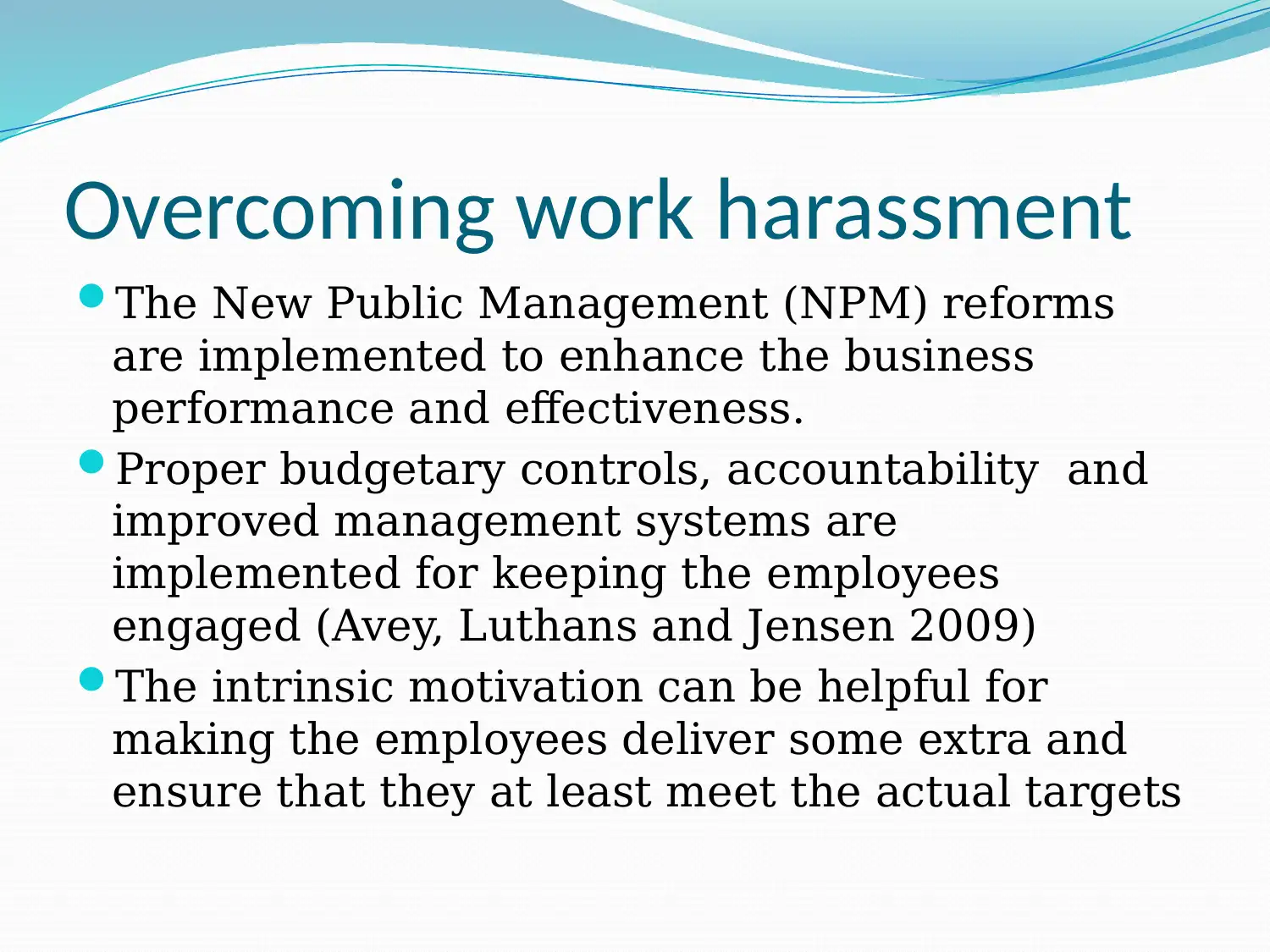
Overcoming work harassment
The New Public Management (NPM) reforms
are implemented to enhance the business
performance and effectiveness.
Proper budgetary controls, accountability and
improved management systems are
implemented for keeping the employees
engaged (Avey, Luthans and Jensen 2009)
The intrinsic motivation can be helpful for
making the employees deliver some extra and
ensure that they at least meet the actual targets
The New Public Management (NPM) reforms
are implemented to enhance the business
performance and effectiveness.
Proper budgetary controls, accountability and
improved management systems are
implemented for keeping the employees
engaged (Avey, Luthans and Jensen 2009)
The intrinsic motivation can be helpful for
making the employees deliver some extra and
ensure that they at least meet the actual targets
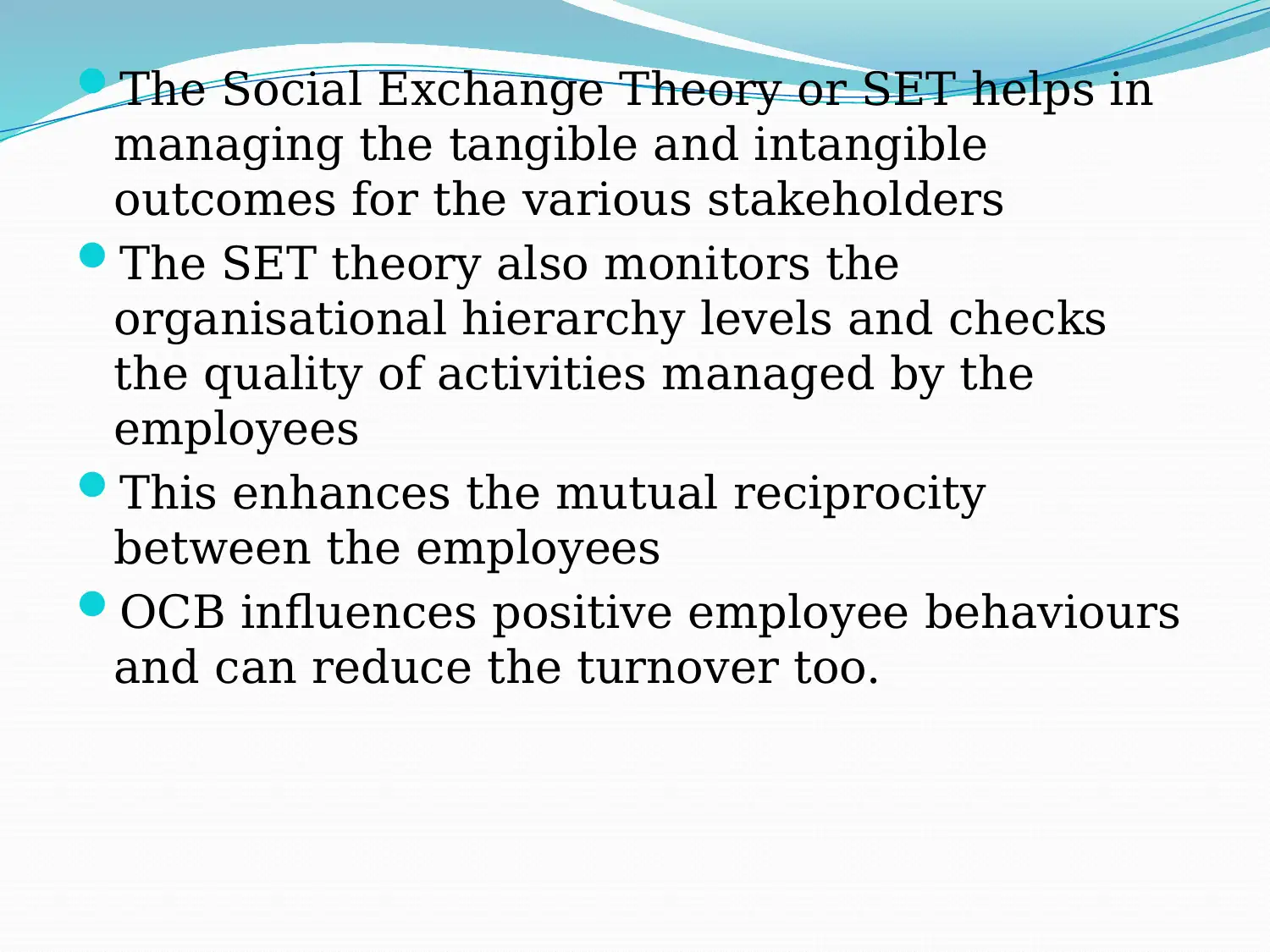
The Social Exchange Theory or SET helps in
managing the tangible and intangible
outcomes for the various stakeholders
The SET theory also monitors the
organisational hierarchy levels and checks
the quality of activities managed by the
employees
This enhances the mutual reciprocity
between the employees
OCB influences positive employee behaviours
and can reduce the turnover too.
managing the tangible and intangible
outcomes for the various stakeholders
The SET theory also monitors the
organisational hierarchy levels and checks
the quality of activities managed by the
employees
This enhances the mutual reciprocity
between the employees
OCB influences positive employee behaviours
and can reduce the turnover too.
⊘ This is a preview!⊘
Do you want full access?
Subscribe today to unlock all pages.

Trusted by 1+ million students worldwide
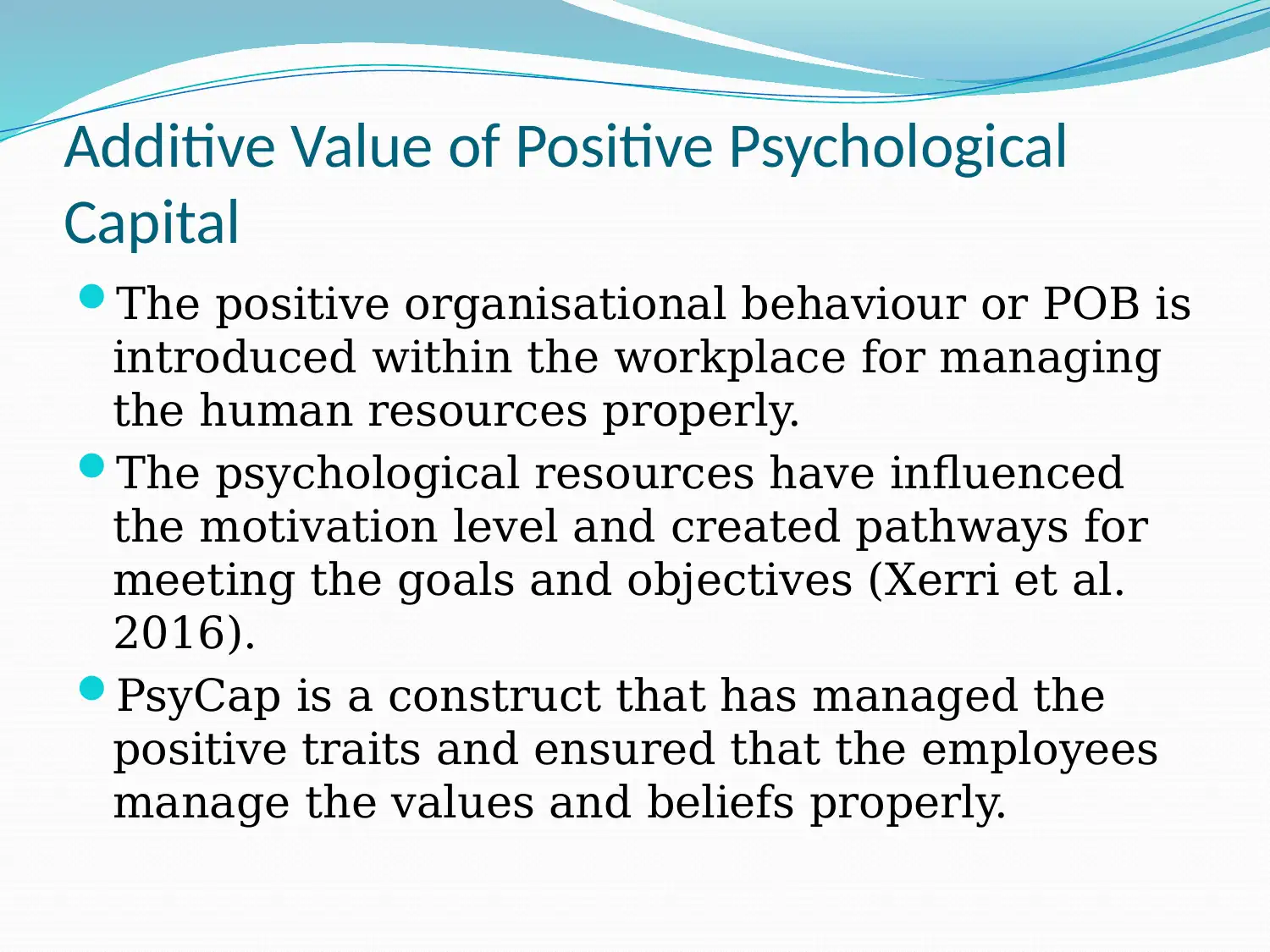
Additive Value of Positive Psychological
Capital
The positive organisational behaviour or POB is
introduced within the workplace for managing
the human resources properly.
The psychological resources have influenced
the motivation level and created pathways for
meeting the goals and objectives (Xerri et al.
2016).
PsyCap is a construct that has managed the
positive traits and ensured that the employees
manage the values and beliefs properly.
Capital
The positive organisational behaviour or POB is
introduced within the workplace for managing
the human resources properly.
The psychological resources have influenced
the motivation level and created pathways for
meeting the goals and objectives (Xerri et al.
2016).
PsyCap is a construct that has managed the
positive traits and ensured that the employees
manage the values and beliefs properly.
Paraphrase This Document
Need a fresh take? Get an instant paraphrase of this document with our AI Paraphraser
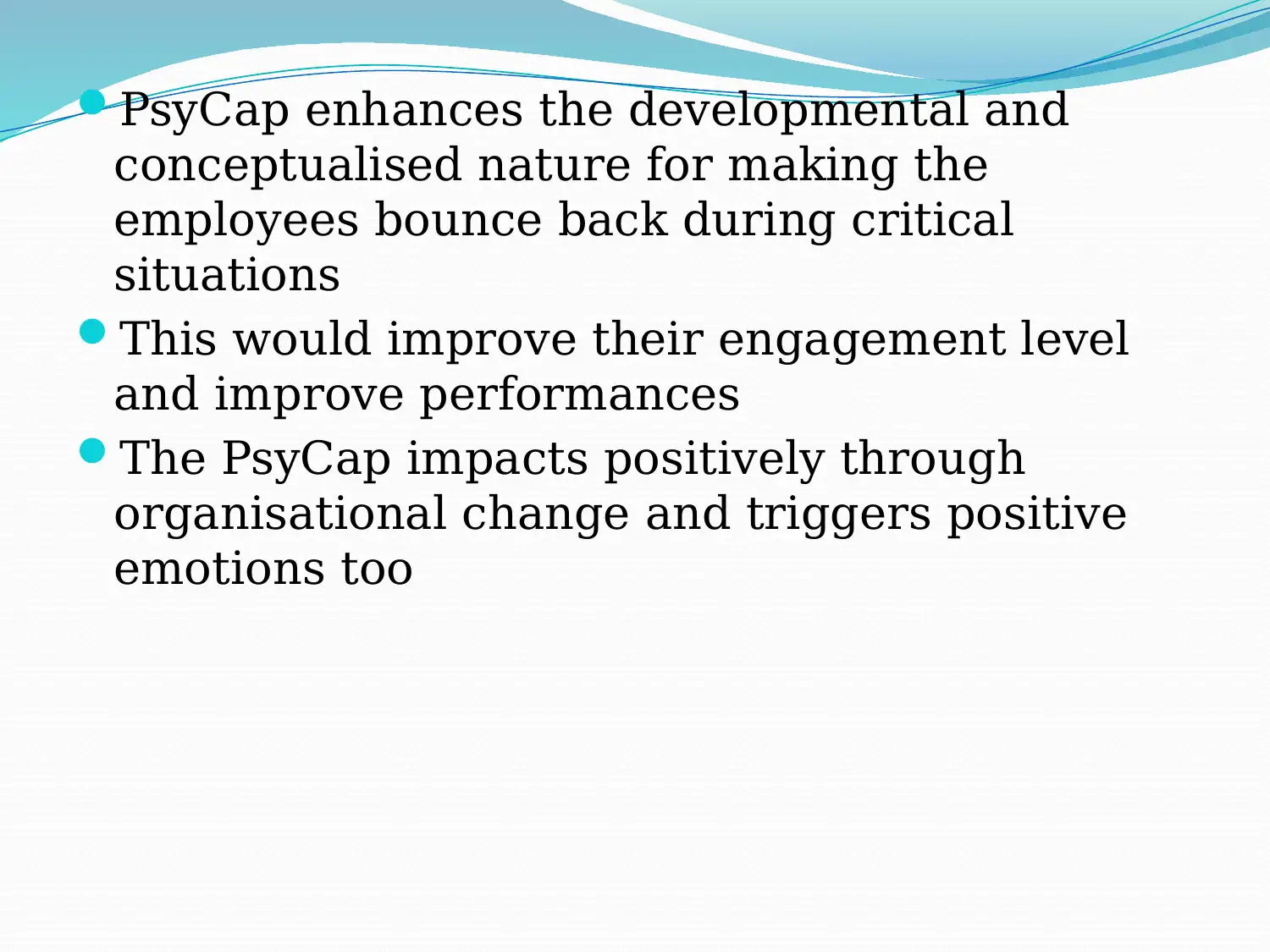
PsyCap enhances the developmental and
conceptualised nature for making the
employees bounce back during critical
situations
This would improve their engagement level
and improve performances
The PsyCap impacts positively through
organisational change and triggers positive
emotions too
conceptualised nature for making the
employees bounce back during critical
situations
This would improve their engagement level
and improve performances
The PsyCap impacts positively through
organisational change and triggers positive
emotions too
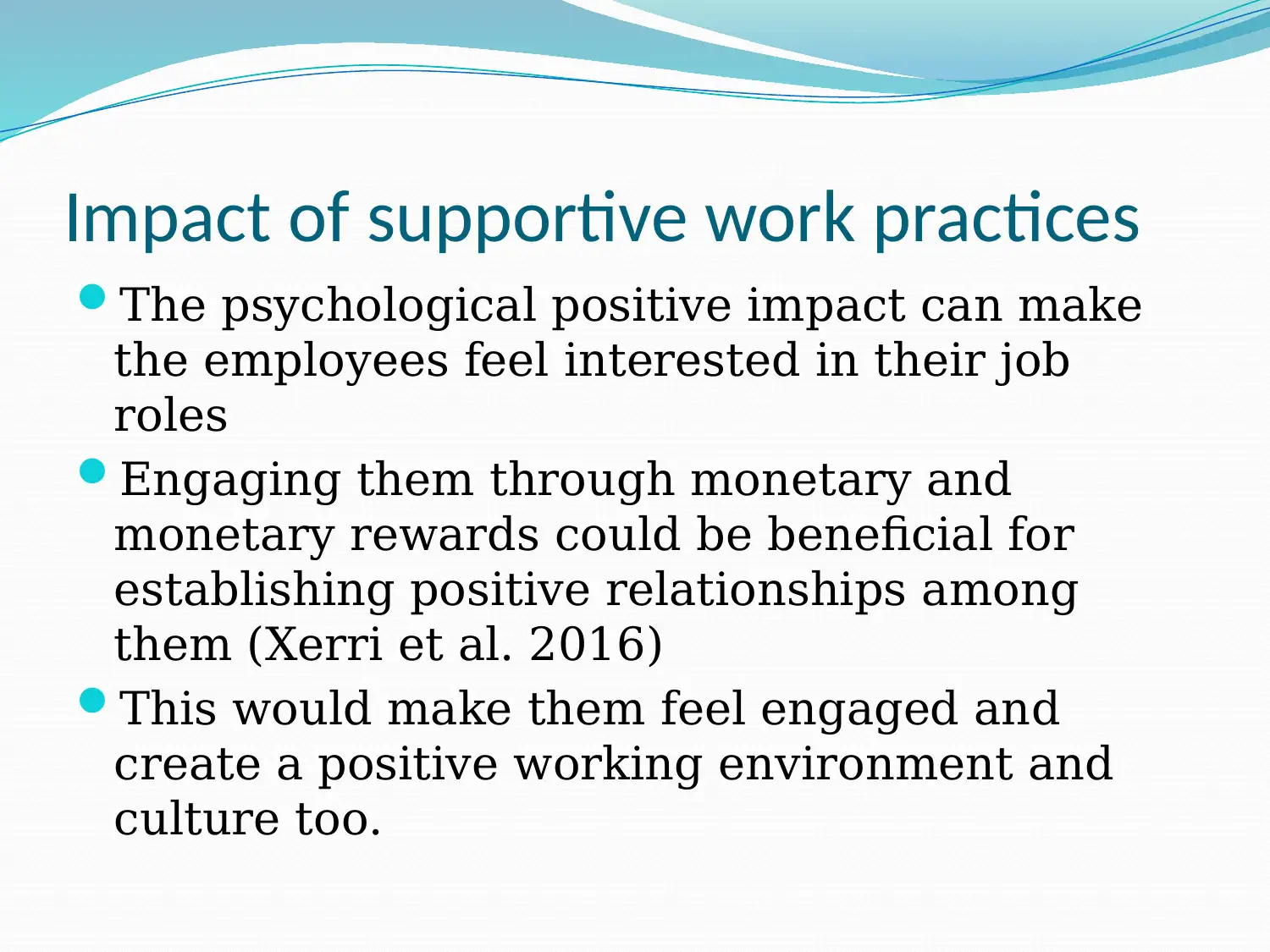
Impact of supportive work practices
The psychological positive impact can make
the employees feel interested in their job
roles
Engaging them through monetary and
monetary rewards could be beneficial for
establishing positive relationships among
them (Xerri et al. 2016)
This would make them feel engaged and
create a positive working environment and
culture too.
The psychological positive impact can make
the employees feel interested in their job
roles
Engaging them through monetary and
monetary rewards could be beneficial for
establishing positive relationships among
them (Xerri et al. 2016)
This would make them feel engaged and
create a positive working environment and
culture too.
⊘ This is a preview!⊘
Do you want full access?
Subscribe today to unlock all pages.

Trusted by 1+ million students worldwide
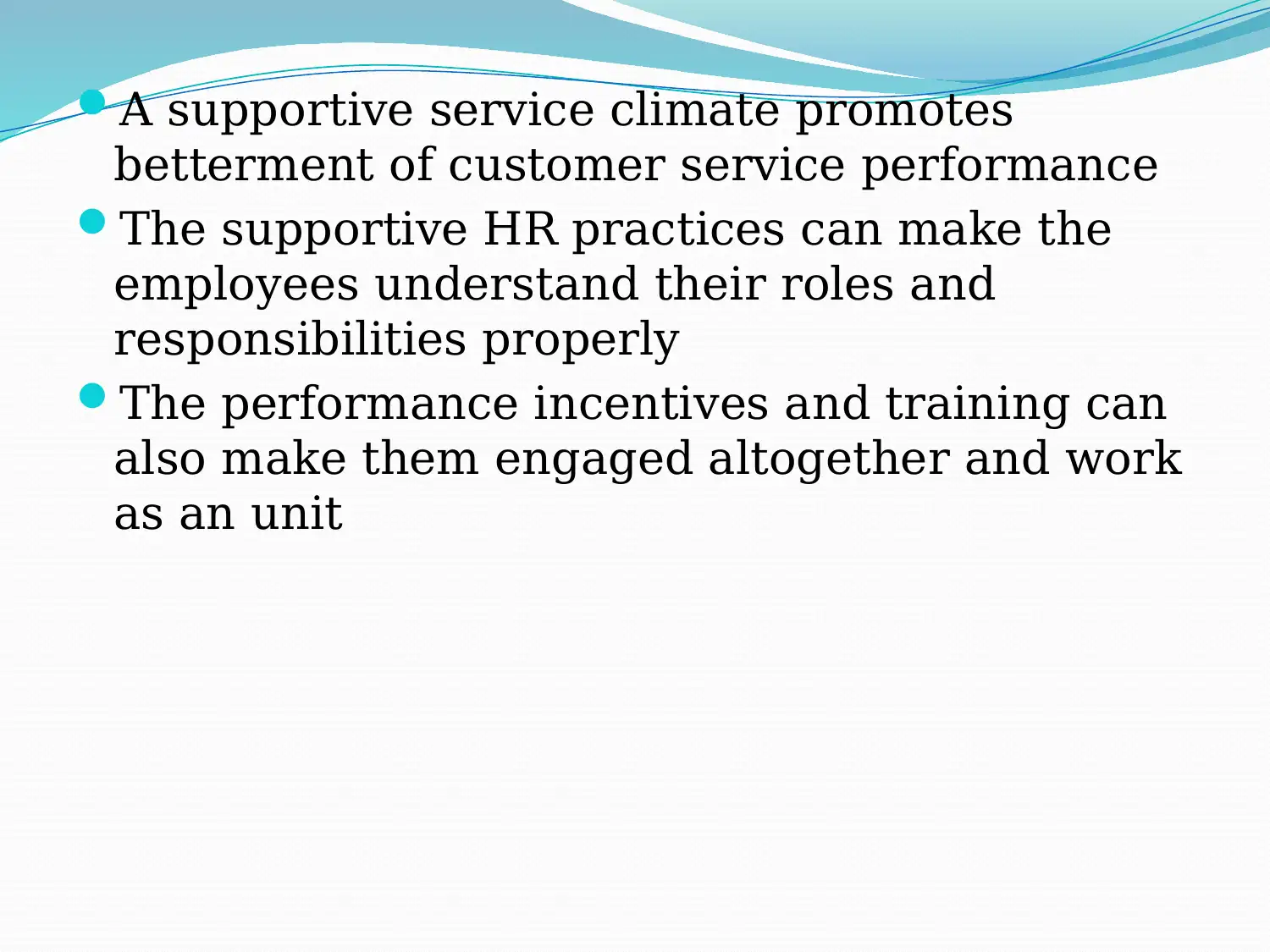
A supportive service climate promotes
betterment of customer service performance
The supportive HR practices can make the
employees understand their roles and
responsibilities properly
The performance incentives and training can
also make them engaged altogether and work
as an unit
betterment of customer service performance
The supportive HR practices can make the
employees understand their roles and
responsibilities properly
The performance incentives and training can
also make them engaged altogether and work
as an unit
Paraphrase This Document
Need a fresh take? Get an instant paraphrase of this document with our AI Paraphraser
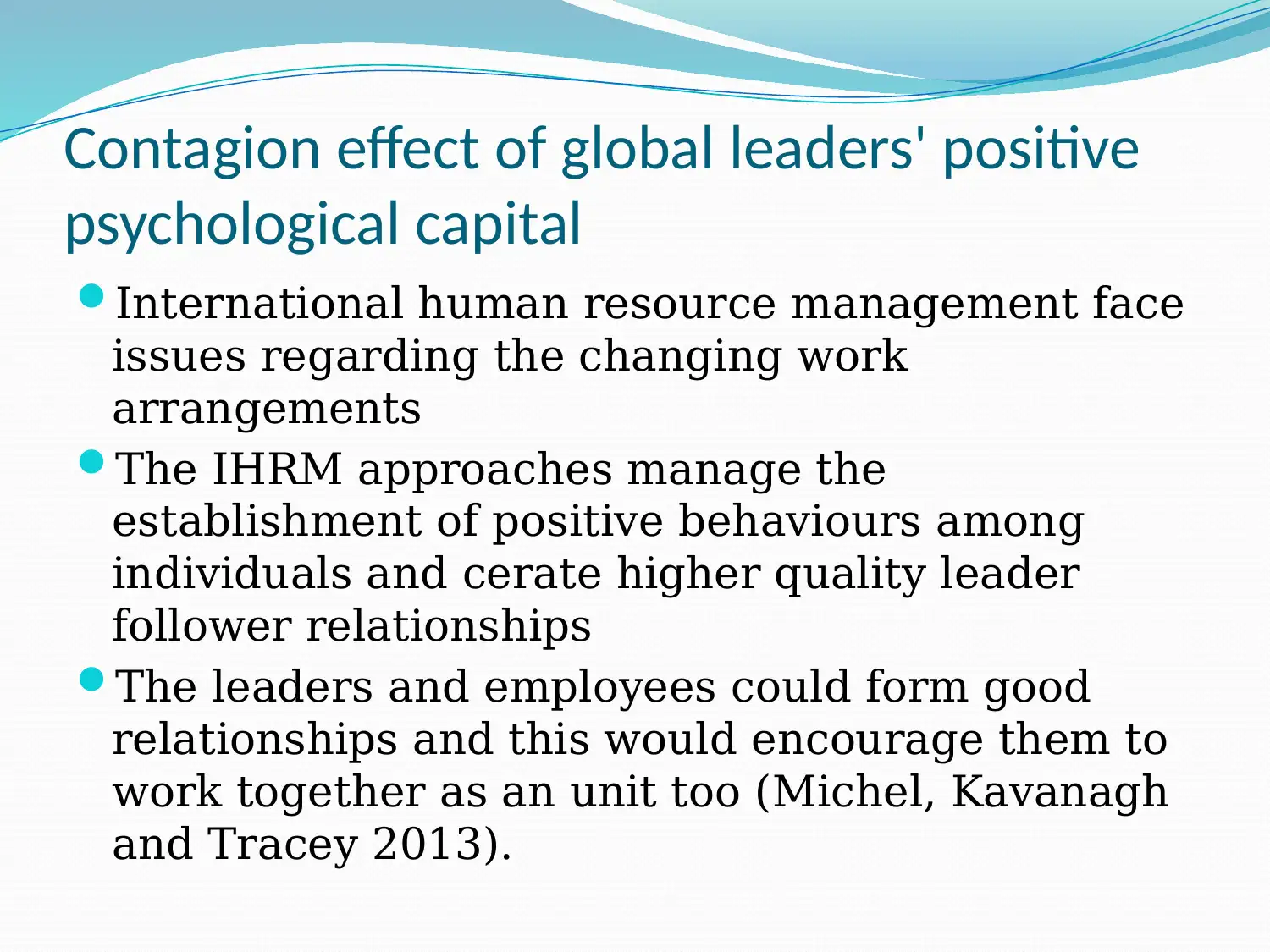
Contagion effect of global leaders' positive
psychological capital
International human resource management face
issues regarding the changing work
arrangements
The IHRM approaches manage the
establishment of positive behaviours among
individuals and cerate higher quality leader
follower relationships
The leaders and employees could form good
relationships and this would encourage them to
work together as an unit too (Michel, Kavanagh
and Tracey 2013).
psychological capital
International human resource management face
issues regarding the changing work
arrangements
The IHRM approaches manage the
establishment of positive behaviours among
individuals and cerate higher quality leader
follower relationships
The leaders and employees could form good
relationships and this would encourage them to
work together as an unit too (Michel, Kavanagh
and Tracey 2013).
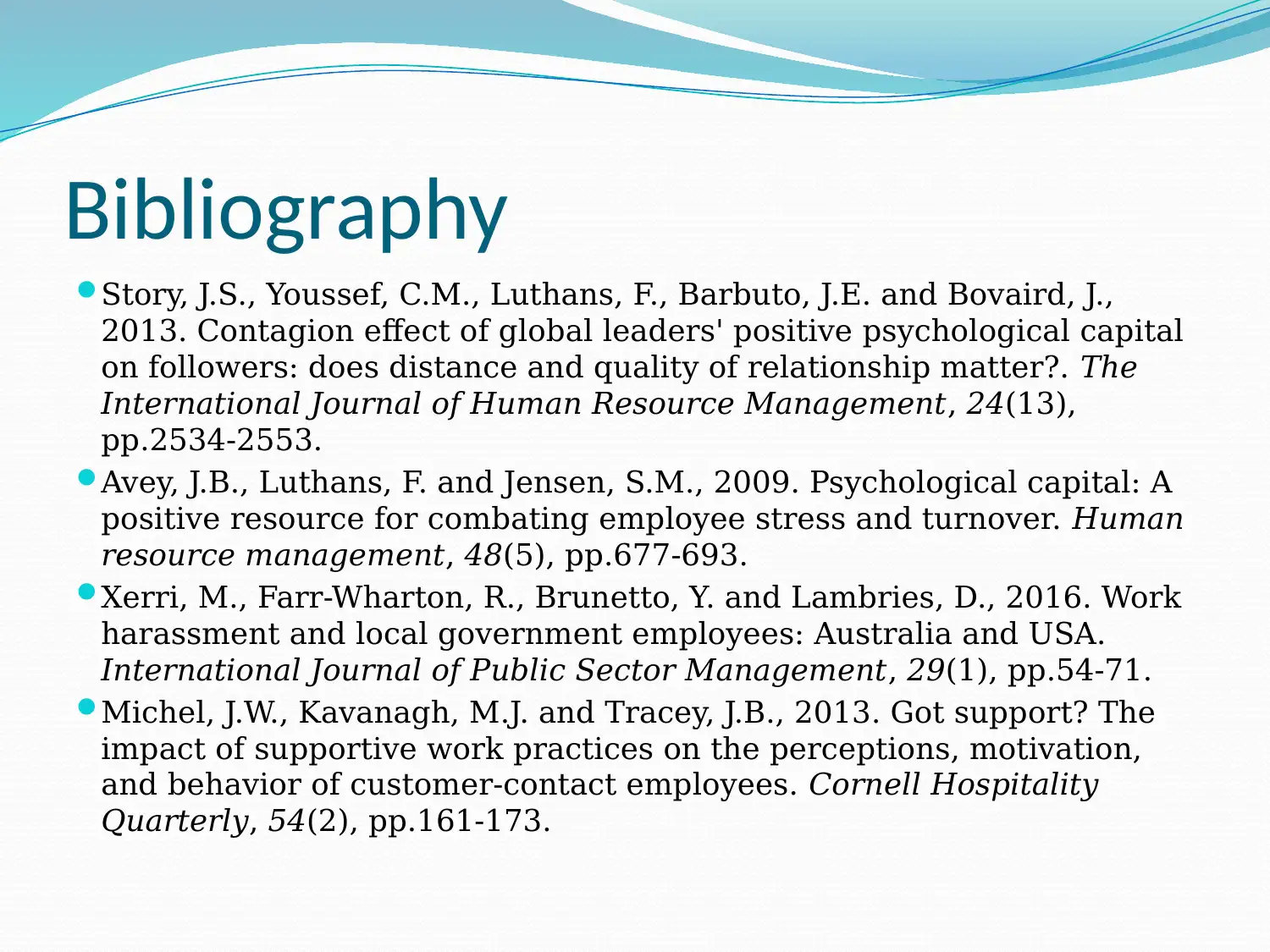
Bibliography
Story, J.S., Youssef, C.M., Luthans, F., Barbuto, J.E. and Bovaird, J.,
2013. Contagion effect of global leaders' positive psychological capital
on followers: does distance and quality of relationship matter?. The
International Journal of Human Resource Management, 24(13),
pp.2534-2553.
Avey, J.B., Luthans, F. and Jensen, S.M., 2009. Psychological capital: A
positive resource for combating employee stress and turnover. Human
resource management, 48(5), pp.677-693.
Xerri, M., Farr-Wharton, R., Brunetto, Y. and Lambries, D., 2016. Work
harassment and local government employees: Australia and USA.
International Journal of Public Sector Management, 29(1), pp.54-71.
Michel, J.W., Kavanagh, M.J. and Tracey, J.B., 2013. Got support? The
impact of supportive work practices on the perceptions, motivation,
and behavior of customer-contact employees. Cornell Hospitality
Quarterly, 54(2), pp.161-173.
Story, J.S., Youssef, C.M., Luthans, F., Barbuto, J.E. and Bovaird, J.,
2013. Contagion effect of global leaders' positive psychological capital
on followers: does distance and quality of relationship matter?. The
International Journal of Human Resource Management, 24(13),
pp.2534-2553.
Avey, J.B., Luthans, F. and Jensen, S.M., 2009. Psychological capital: A
positive resource for combating employee stress and turnover. Human
resource management, 48(5), pp.677-693.
Xerri, M., Farr-Wharton, R., Brunetto, Y. and Lambries, D., 2016. Work
harassment and local government employees: Australia and USA.
International Journal of Public Sector Management, 29(1), pp.54-71.
Michel, J.W., Kavanagh, M.J. and Tracey, J.B., 2013. Got support? The
impact of supportive work practices on the perceptions, motivation,
and behavior of customer-contact employees. Cornell Hospitality
Quarterly, 54(2), pp.161-173.
⊘ This is a preview!⊘
Do you want full access?
Subscribe today to unlock all pages.

Trusted by 1+ million students worldwide
1 out of 13
Related Documents
Your All-in-One AI-Powered Toolkit for Academic Success.
+13062052269
info@desklib.com
Available 24*7 on WhatsApp / Email
![[object Object]](/_next/static/media/star-bottom.7253800d.svg)
Unlock your academic potential
Copyright © 2020–2026 A2Z Services. All Rights Reserved. Developed and managed by ZUCOL.



